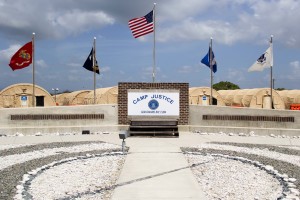WASHINGTON–When then-President George W. Bush established the Office of Military Commissions in 2004, it was well understood that the commissions would be used to try the detainees held in Guantanamo Bay without affording them the full set of rights granted to the accused in a civilian court. The Bush Administration stated that explicitly.
However, over time, as different iterations of the commissions system have been struck down and reformed, some of those rights have been reinstated. For instance, the detainees now have the right to an attorney as well as the ability to challenge their detainment . But many of the problems are caused by legal minutiae that does not easily attract public attention, and they have survived. One such troubling detail is legal discovery as it is conducted in Guantanamo Bay.
Discovery is not an esoteric element of the military court system; it’s a fundamental process any trial attorney in the United States understands well. It occurs in the pretrial phase, in which both parties can request, and even compel, the production of documents and other evidence relevant to the case—particularly if it helps a defendant fight the charges against him and even beat those charges. In civilian court, the process is nearly always uncontroversial. In Guantanamo Bay, the difficulties surrounding discovery speak to the heart of why many people believe the commissions are fundamentally unfair.
There are two persistent problems with discovery in Guantanamo, experts and participants say: One legal, one structural.
The legal problem derives from the use of one word– “reasonable.” Reasonable doesn’t sound like a particularly pernicious term, but in this instance it represents a significant erosion of the discovery process.
In civilian courts and in military courts martial, the two sides have an equal right to discovery, meaning they can both compel one another to produce whatever information they feel is relevant to the case. In the military commissions, the defense only has a reasonable right to discovery, meaning that the prosecution can decide what information it is going to turn over.
Air Force Col. David Frakt , who defended Mohamed Jawad before the military commissions, said discovery was an enormous problem during Jawad’s trial and remains so to this day.
“I’ve never encountered anything like that,” he said . “There was problems with access to witnesses. They wouldn’t even provide me with a list of witnesses.”
The Office of Military Commissions could not immediately be reached for comment.
During the pretrial hearings for Omar Khadr, a 23-year-old Canadian citizen currently being prosecuted in a military commission, in April, Khadr’s civilian attorneys frequently complained that they had only been given access to a small handful of the more than 30 people who interrogated Khadr.
Lt. Col. Darrel Vandeveld was on the team of attorneys that prosecuted Jawad, and eventually asked to be reassigned because of ethical concerns about the commissions, including discovery. Vandeveld said he fought with his fellow prosecuting attorneys over their routine attempts to deny access to witnesses. However, even in the instances in which they did make a good faith effort to provide the defense with all the available information, it was difficult because the evidence against Jawad was never compiled into a usable compendium.
“Nobody had made a discernible effort to assemble a prosecution package,” said Vandeveld. “Many documents were missing.”
One piece of evidence was a video tape of one of Jawad’s interrogations which Vandeveld believed might have shown Jawad being tortured.
“I scoured the earth trying to find this thing,” said Vandeveld. “There is no question in my mind the tape did exist.”
Vandeveld pointed to the Guantanamo Review Task Force’s final report, published in January, which stated that, in the time since he and Frakt had been assigned to the commissions, no such compendium had been produced.
“The Task Force’s initial responsibility was to collect all government information,” it read, “to the extent reasonably practicable, relevant to determining the proper disposition of each detainee. The government did not have a preexisting, consolidated repository for such information.”
Both Frakt and Vandeveld find such a fact to be inexcusable.
“They’ve had eight years to prepare these things,” said Frakt. “There is no excuse to not provide complete, comprehensive discovery the day the charges are filed.”







